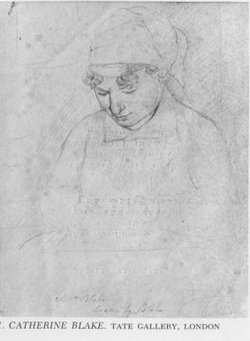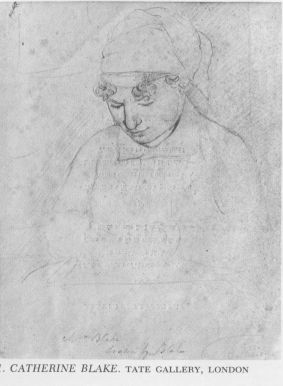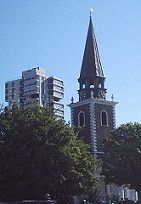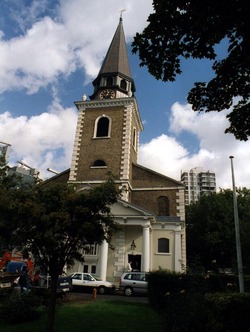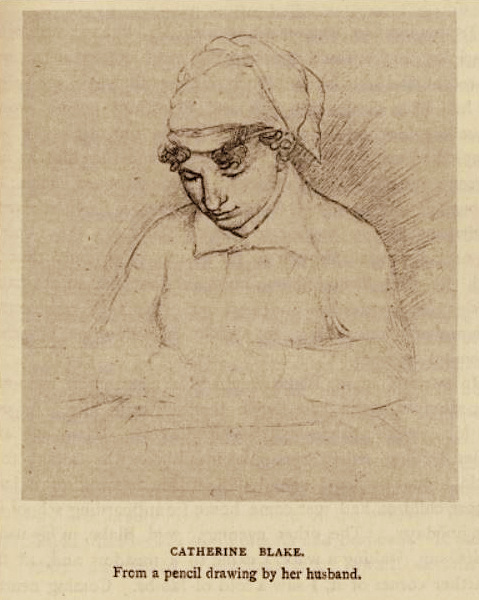Her middle name may have been Sophie.
Cathy originally lived in Battersea, and was the daughter of a market-gardener. She was French speaking - having no English, yet she married a substantial middle-class Englishman, William Blake, now remembered as a poet and illustrator (references to his being an anarchist are ill-judged, and are insulting to William, who was a diligent and hard-working man). Illiterate, Cathy was unable to sign her marriage document, yet may have been accepted into polite 18th Century British society, in spite of the hostility between England and France. The marriage was said to be good (by modern writers), though Cathy may have objected to William's roving eye and there may have been no marriage bed. Cathy was surely a Huguenot. This could explain William Blake's being free to marry her, as he would not have married a Catholic, he being non-conformist. Huguenots proliferated around Wandsworth and Battersea. However, I have no evidence of members of the Boucher family being buried at Mount Nod, so assume that Cathy's parents must be buried at St Mary's Battersea.
50,000 Hugenots left France in 1685. This would make Cathy a third-generation immigrant. Would she still have been 'without English'? Bear in mind that there could be three generations of illiterate Punjabi speakers in England. Was she, then, born in England or France? If she was born in France, would she not have been a Catholic?
French speakers would have been as common in Battersea as German speakers were in Whitechapel.
Battersea market gardens in the 18th Century: 300 acres total: 20 market gardeners: size between 6 and 60 acres per garden: wages: men 10 to 12 shillings per week; women 5 to 7 shillings per week: one shilling = five (new) pence (or twelve old pence): women walked from Shropshire and North Wales during the season: Battersea was considered advantageous: work was available, wages were good and the living was cheap: agricultural land in Battersea cost up to six pounds per acre and the tithe paid to the Church was seven shillings and sixpence per acre.
The Jury is out on William Blake. There has been a concerted effort to polish his image. Did this 'devout Christian' indeed fall 'madly in love' or, was it that, unable to attract a woman of his own class - bearing in mind that such a woman would be likely to have a bit of mouth on her - he picked, a poor wretch that he could 'protect' - that is - possess? We don't know. Certainly, Cathy appears to have suffered a life of drudgery ('She may get weary' to quote the old song), though she appears to have been devoted to William. The Blakes lived in London, variously, at Leicester Fields (could that mean Mayfair?), Broad Street Soho , Poland Street, Hercules Road (south of the river), South Molton Street and Fountain Court.
There is a move underfoot to provide hard-standing at William Blake's grave, but it would invite the whole world to trample on the dead with impunity. It should be noted that Bunhill Fields is a non-consecrated site. Those buried there are likely to be Quakers and other non-conformists.
Her middle name may have been Sophie.
Cathy originally lived in Battersea, and was the daughter of a market-gardener. She was French speaking - having no English, yet she married a substantial middle-class Englishman, William Blake, now remembered as a poet and illustrator (references to his being an anarchist are ill-judged, and are insulting to William, who was a diligent and hard-working man). Illiterate, Cathy was unable to sign her marriage document, yet may have been accepted into polite 18th Century British society, in spite of the hostility between England and France. The marriage was said to be good (by modern writers), though Cathy may have objected to William's roving eye and there may have been no marriage bed. Cathy was surely a Huguenot. This could explain William Blake's being free to marry her, as he would not have married a Catholic, he being non-conformist. Huguenots proliferated around Wandsworth and Battersea. However, I have no evidence of members of the Boucher family being buried at Mount Nod, so assume that Cathy's parents must be buried at St Mary's Battersea.
50,000 Hugenots left France in 1685. This would make Cathy a third-generation immigrant. Would she still have been 'without English'? Bear in mind that there could be three generations of illiterate Punjabi speakers in England. Was she, then, born in England or France? If she was born in France, would she not have been a Catholic?
French speakers would have been as common in Battersea as German speakers were in Whitechapel.
Battersea market gardens in the 18th Century: 300 acres total: 20 market gardeners: size between 6 and 60 acres per garden: wages: men 10 to 12 shillings per week; women 5 to 7 shillings per week: one shilling = five (new) pence (or twelve old pence): women walked from Shropshire and North Wales during the season: Battersea was considered advantageous: work was available, wages were good and the living was cheap: agricultural land in Battersea cost up to six pounds per acre and the tithe paid to the Church was seven shillings and sixpence per acre.
The Jury is out on William Blake. There has been a concerted effort to polish his image. Did this 'devout Christian' indeed fall 'madly in love' or, was it that, unable to attract a woman of his own class - bearing in mind that such a woman would be likely to have a bit of mouth on her - he picked, a poor wretch that he could 'protect' - that is - possess? We don't know. Certainly, Cathy appears to have suffered a life of drudgery ('She may get weary' to quote the old song), though she appears to have been devoted to William. The Blakes lived in London, variously, at Leicester Fields (could that mean Mayfair?), Broad Street Soho , Poland Street, Hercules Road (south of the river), South Molton Street and Fountain Court.
There is a move underfoot to provide hard-standing at William Blake's grave, but it would invite the whole world to trample on the dead with impunity. It should be noted that Bunhill Fields is a non-consecrated site. Those buried there are likely to be Quakers and other non-conformists.
Advertisement
Explore more
Sponsored by Ancestry
Advertisement
